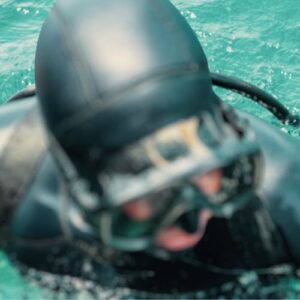Introduction
Underwater diving in various temperatures comes with its own set of hazards. When water temperatures are very low, divers face the risks of cold stress and hypothermia. Conversely, hot water can lead to heat exhaustion. In this article, I will explore the potential dangers associated with both cold and hot water diving and highlight the precautions underwater divers should take to ensure their safety.

Cold Water Hazards: Cold Stress
When SCUBA divers enter very cold water, they experience a phenomenon known as “Cold Shock.” Initially, the body tries to warm up the extremities by increasing blood flow. However, as time passes, vasoconstriction occurs, causing extremities to become colder to preserve core temperatures. This can lead to several effects, including a loss of manual dexterity, impaired hand-eye coordination, and reduced decision-making ability.

Cold Water Hazards: Hypothermia
Prolonged exposure to extremely cold water can result in hypothermia, wherein the underwater diver’s body temperature plummets, potentially leading to unconsciousness. To avoid this dangerous condition, divers must take suitable precautions to keep themselves warm throughout the underwater dive.

Precautions for Diving in Cold Water
When diving in cold water, it is crucial to wear appropriate thermal protection, such as a wetsuit or dry suit, to minimize the effects of cold stress and prevent hypothermia. Additionally, regular breaks in a heated environment and warm fluids can help maintain body temperature during surface intervals.

Hot Water Hazards: Heat Exhaustion
While encounters in hot water during underwater dives are relatively rare, they still pose risks to divers. Heat exhaustion can occur when the body generates more heat than it can dissipate, leading to symptoms such as fatigue, dizziness, and nausea. For working divers, water temperature exceeding 30°C can present a risk, while temperatures exceeding 35°C are a concern for divers at rest.

Precautions for Diving in Hot Water
To mitigate the risks of heat exhaustion, divers should prioritize hydration and take frequent breaks in shaded or cool areas during surface intervals. Proper ventilation in underwater diving equipment can also help dissipate excess heat and maintain a comfortable body temperature.

Conclusion:
In conclusion, underwater divers need to be aware of the hazards associated with both cold and hot water diving. Cold water can lead to cold stress and hypothermia, affecting manual dexterity, hand-eye coordination, and decision-making abilities. Hot water poses the risk of heat exhaustion, resulting in fatigue and discomfort.
By taking appropriate precautions, such as wearing suitable thermal protection and staying hydrated, divers can ensure their safety and enjoy their underwater adventures in various water temperatures.

